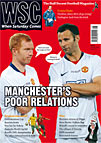 Latvia's unstable economy has affected football too, as Daunis Auers explains
Latvia's unstable economy has affected football too, as Daunis Auers explains
The 2009 Latvian Virsliga season kicked off in mid-March under cold and dark skies. So cold and dark, in fact, that pitches across the country remained frozen, forcing games to be played at the Riga Olympic Centre, a modest indoor facility with a tight, vertigo-inducing balcony along one side of the pitch. Two rows of free-standing chairs give it a capacity of about 300.
On the plus side, this meant that the FK Skonto v Tranzits game that I attended was an uncommon sell-out. Indeed, the game was marked by a single goal of diffident skill, rowdy singing and chanting by four preposterous Skonto “ultras”, and, although there were no carpet-burn inducing tackles, enough headbands, gesticulations, socks pulled up over the knees and stroppy foreign players to keep any Premier League-influenced supporter of the modern game happy. At the same time, however, the game descended into farce as clearances started smacking into the low-hanging metal beams criss-crossing the ceiling, and players took increasing advantage of the short pitch by pinging shots from the half-way line.
This will be a crunch season for the future of the professional league in Latvia. A disintegrating economy (GDP will shrink by around 18 per cent in 2009, and the state is being kept alive by IMF and other foreign lender handouts) has impoverished the mini-oligarchs that subsidised the game in recent years.
Latvian football had been the ultimate ego trip for Latvian businessmen. While Roman Abramovich may still hope to claw back some of his Chelsea investment at some point in the distant future, a Latvian football club cannot be run at anything even approaching a profit. Attendances are abysmal. Clubs actually pay to appear on TV.
The only business “strategy” is to nurture young talent and sell it on. However, the only club with a serious youth development programme, FK Skonto, has not produced a decent player since nippy striker Maris Verpakovskis was sold to Dynamo Kiev in 2003 (and he was, in any case, poached from FK Liepaja).
Several clubs – including FK Riga, who were playing in the Intertoto Cup this time last year – have simply folded. Others merged. There being few fans, none were mourned. Indeed, of the nine teams in the Virsliga this season (one less than last year), three are less than four years old.
Public interest in football re-mains pathetically low. A new football stadium opened in Daugavpils with much pomp at the start of the 2008 season. The capacity of just 500 seats (in a city with a population of 110,000 – bigger than Blackburn or Oldham) indicates the owner’s ambitions. Indeed, total attendance for the 143 top-flight games in the 2008 season was 75,142, less than the capacity of Old Trafford. Average attendance was just 530 (down from a peak of 712 in 2006), although even this figure is inflated due to the habit rounding up attendance numbers.
Only now, with the collapse in sponsorship, have clubs started discussing ways of increasing attendances. The dearth of ideas is indicated by FK Skonto owners’ suggestion that attendances might be increased by giving more playing time to youngsters, who would then encourage their friends and families to attend games. However, rather than playing youngsters, impoverished clubs are searching ever farther for cheap talent – Dinaburg Daugavpils signed two 18-year-old North Korean Under-21 internationals at the start of the season.
A journalist argued that returning migrant workers from Ireland and Britain may bring back the British football atmosphere and fan culture. Judging by the smashed Burberry-clad brute who spent much of a recent international against Denmark standing, yelling incomprehensible insults and waving two fingers at the visiting fans, this might not be entirely positive.
It was not supposed to be like this. Just a half-decade ago, the national team had stylishly qualified for Euro 2004, and managed to achieve its aim – of not being an utter embarrassment – by scoring a goal (in a 2‑1 defeat to the Czech Republic in the opening game) and gaining a point (in a tense 0‑0 draw with Germany). Latvian footballers were playing in the English Premier League and being snapped up by ambitious Russian clubs. These days, the players are back playing in Latvia, or have settled for Inter Baku (Azerbaijan) and Inverness, rather than Dynamo Kiev and Arsenal.
The only bright spot is the national team. The return of Latvia’s successful coach Andrejs Starkovs has led to the renewal of 2004’s ferocious brand of all-out, high tempo football. Back-to-back wins in March left Latvia just three points from the top of their group table, and dreaming of South Africa. Mind you, even if Latvia qualify there won’t be too many fans able to afford the trip.
From WSC 270 August 2009